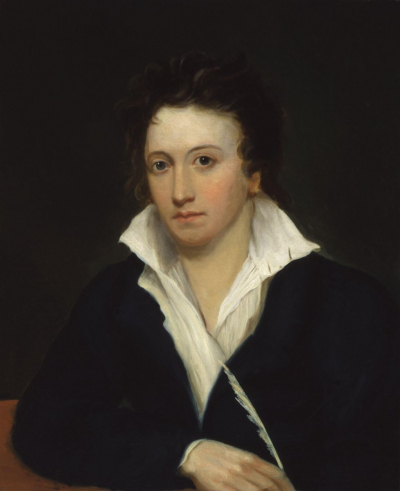"The Necessity of Atheism" is an essay on atheism by the English poet Percy Bysshe Shelley, printed in 1811 by Charles and William Phillips in Worthing while Shelley was a student at University College, Oxford.
An enigmatically signed copy of the short tract was sent to all the heads of Oxford colleges at the University. At that time the content was so shocking to the authorities that he was rusticated for contumacy in his refusing to deny authorship, together with his friend and fellow student, Thomas Jefferson Hogg, who may have been co-author. A revised and expanded version of the text was included as one of the notes to Shelley's poem Queen Mab in 1813, and some reprints with the title The Necessity of Atheism are based on this rather than the 1811 pamphlet.
Percy Bysshe Shelley ( (listen) BISH; 4 August 1792 – 8 July 1822) was one of the major English Romantic poets. A radical in his poetry as well as in his political and social views, Shelley did not achieve fame during his lifetime, but recognition of his achievements in poetry grew steadily following his death and he became an important influence on subsequent generations of poets including Robert Browning, Algernon Charles Swinburne, Thomas Hardy, and W. B. Yeats. American literary critic Harold Bloom describes him as "a superb craftsman, a lyric poet without rival, and surely one of the most advanced sceptical intellects ever to write a poem."
Shelley's critical reputation fluctuated during the 20th century, but in recent decades he has achieved increasing critical acclaim for the sweeping momentum of his poetic imagery, his mastery of genres and verse forms, and the complex interplay of sceptical, idealist, and materialist ideas in his work. Among his best-known works are "Ozymandias" (1818), "Ode to the West Wind" (1819), "To a Skylark" (1820), and the political ballad "The Mask of Anarchy" (1819). His other major works include the verse drama The Cenci (1819) and long poems such as Alastor, or The Spirit of Solitude (1815), Julian and Maddalo (1819), Adonais (1821), Prometheus Unbound (1820)—widely considered his masterpiece—Hellas (1822), and his final, unfinished work, The Triumph of Life (1822).
Shelley also wrote prose fiction and a quantity of essays on political, social, and philosophical issues. Much of this poetry and prose was not published in his lifetime, or only published in expurgated form, due to the risk of prosecution for political and religious libel. From the 1820s, his poems and political and ethical writings became popular in Owenist, Chartist, and radical political circles and later drew admirers as diverse as Karl Marx, Mahatma Gandhi, and George Bernard Shaw.Shelley's life was marked by family crises, ill health, and a backlash against his atheism, political views and defiance of social conventions. He went into permanent self-exile in Italy in 1818, and over the next four years produced what Leader and O'Neill call "some of the finest poetry of the Romantic period". His second wife, Mary Shelley, was the author of Frankenstein. He died in a boating accident in 1822 at the age of 29.

1811Mar, 25
Percy Bysshe Shelley is expelled from the University of Oxford for publishing the pamphlet The Necessity of Atheism.
Choose Another Date
Events on 1811
- 5Mar
Battle of Barrosa
Peninsular War: A French force under the command of Marshal Victor is routed while trying to prevent an Anglo-Spanish-Portuguese army from lifting the Siege of Cádiz in the Battle of Barrosa. - 5May
Battle of Fuentes de Oñoro
In the second day of fighting at the Peninsular War Battle of Fuentes de Oñoro the French army, under Marshall André Masséna, drive in the Duke of Wellington's overextended right flank, but French frontal assaults fail to take the town of Fuentes de Oñoro and the Anglo-Portuguese army holds the field at the end of the day. - 16May
Battle of Albuera
Peninsular War: The allies Spain, Portugal and United Kingdom, defeat the French at the Battle of Albuera. - 7Nov
Battle of Tippecanoe
Tecumseh's War: The Battle of Tippecanoe is fought near present-day Battle Ground, Indiana, United States. - 28Nov
Piano Concerto No. 5 (Beethoven)
Beethoven's Piano Concerto No. 5 in E-flat major, Op. 73, premieres at the Gewandhaus in Leipzig.

 English
English  español
español  français
français  português
português  русский
русский  العربية
العربية  简体中文
简体中文 